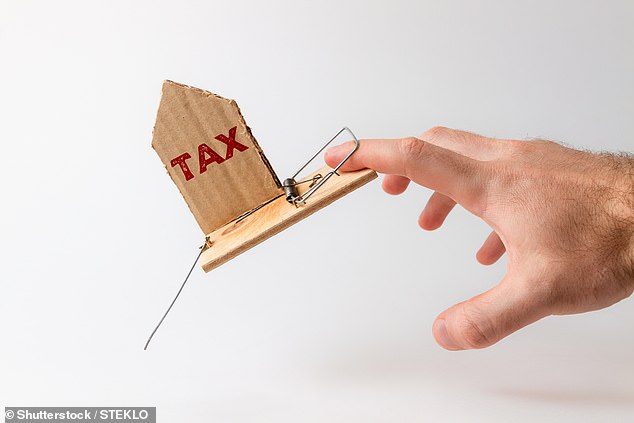Table of Contents
It is surprising that the 60 percent tax trap set a decade and a half ago persists.
In April 2009, against a backdrop of emergency measures for the financial crisis, Chancellor Alistair Darling announced that the personal allowance would begin to be phased out at a rate of £1 for every £2 earned above £100,000.
This created Britain’s highest effective income tax rate of 60 per cent.
It is widely considered to be one of the most perverse and unfair parts of our tax system. And yet, almost 15 years and seven Conservative chancellors later, the 60 per cent tax rate remains in place.
Sting: Removal of personal allowance creates 60% income tax trap between £100,000 and £125,140
Of course, it is not an official income tax rate. Currently they are 20 percent, 40 percent and 45 percent.
But actually the income tax system is structured so that the rates are 20 percent, 40 percent, 60 percent, 45 percent.
Someone on £100,000 may be earning a lot of money, but those in this group pay a higher marginal tax rate – which applies to the next pound earned – than people who are paid much more.
The current 60 per cent bracket ranges from £100,000 to £125,140, at which point the personal allowance disappears entirely and the marginal tax rate returns to 45 per cent.
It works like this. If someone earns £100,000 and gets a £5,000 pay rise, they will lose 60 per cent in income tax. Whereas, if someone earns £200,000 and gets a £5,000 pay rise, they will lose 45 per cent of it in income tax.
Clearly, this is crazy.
What makes it even crazier is that the £100,000 threshold hasn’t moved. If it had risen with inflation since 2009, it would now be £153,000.
So why hasn’t anything been done about it?
I think the answer lies mainly in two elements:
Firstly, it is very difficult to generate sympathy for people who earn £100,000 a year.
Second, politicians have spent the years since the financial crisis terrified at the idea of doing anything with taxes that might appear to favor the rich, even if that tax is obviously stupid.
And so, for 15 years, a bad tax has not only remained in place, but has managed to get even worse due to the fiscal burden.
Politicians are terrified of doing anything with taxes that might appear to favor the rich, even if that tax is obviously stupid.
A similar issue has also been ignored at lower levels of the income scale with the removal of child benefit between £50,000 and £60,000.
This creates a marginal tax rate of 51 percent for a parent with one child or 59 percent if they have two children.
It affects couples where one parent’s income is above that level, although both could earn £49,999 and be fine.
Once again, the threshold has not moved in the eleven years since George Osborne introduced tapering; If he had done so, he would be worth £67,000.
As you may have guessed from a column that began with a throwback to 2009, these tax traps are not new news.
This type of unfair treatment undermines the tax system.
You may have heard me complain about them before. This kind of unfair treatment that undermines the tax system is one of my biggest pet peeves and I’ve been harping on both for years.
The interesting thing now is that there seems to be a groundswell of opinion forming that we should get rid of these tax traps.
The general tone of the debate in reader comments on our articles on scrapping child benefits and the 60 per cent tax has shifted from a lack of sympathy for higher earners to annoyance and anger towards these pernicious parts of the tax system.
This is evident in the comments in Steve Webb’s latest column, where he answers a reader’s question about whether paying a pension can exceed the 60 per cent tax.
Surely a Chancellor will eventually have to be brave enough to clean up this mess?
The next budget is less than a month away, so will Jeremy Hunt be that bold chancellor?
This is the money podcast

